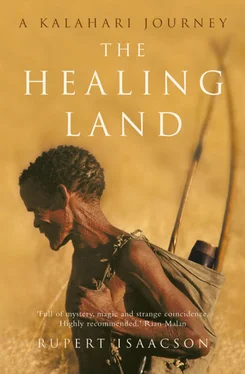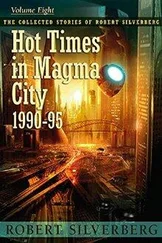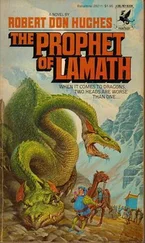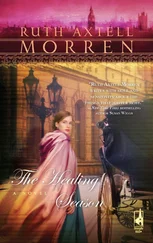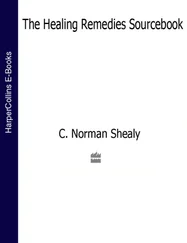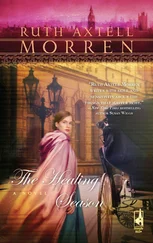THE HEALING LAND
A KALAHARI JOURNEY
Rupert Isaacson
This edition first published in 2002
First published in Great Britain in 2001 by
Fourth Estate
1 London Bridge Street,
London SE1 9GF
www.4thestate.co.uk
Copyright © Rupert Isaacson 2001
The right of Rupert Isaacson to be identified as the author of this
work has been asserted by him in accordance with the Copyright,
Designs and Patents Act 1988
A catalogue record for this book is available from the
British Library.
All rights reserved under International and Pan-American Copyright Conventions. By payment of the required fees, you have been granted the nonexclusive, nontransferable right to access and read the text of this e-book on-screen. No part of this text may be reproduced, transmitted, downloaded, decompiled, reverse engineered, or stored in or introduced into any information storage and retrieval system, in any form or by any means, whether electronic or mechanical, now known or hereinafter invented, without the express written permission of HarperCollins e-books.
Ebook Edition © DECEMBER 2012 ISBN 9780007393428
Version 2017-08-07
HarperCollinsPublishers has made every reasonable effort to ensure that any picture content and written content in this ebook has been included or removed in accordance with the contractual and technological constraints in operation at the time of publication.
For the Ancestors
Circling, circling …
I have entered the airy, dancing lightness of love.
Rumi
Cover
Title Page
Copyright
Dedication
Epigraph
Map
Part One: Ancestral Voices
1 Stories and Myths
2 Lessons in Reality
3 Under the Big Tree
Part Two: The Mantis, The Mouse and The Bird
4 Regopstaan’s Prophecy
5 A Human Zoo
6 Old Magic, New Beliefs
7 Trance Dance at Buitsevango
8 Into the Central Kalahari
Part Three: The Good Little Donkeys
9 Revelations at the Red House
10 The Same Blood
11 Dream and Disillusion
12 The Leopard Man
13 Dawid Makes a Request
14 Bushman Politics
15 Off to See a Wizard
16 The River of Spirits
17 What Happened After
Glossary
Acknowledgements
About the Author
About the Publisher
PART ONE ANCESTRAL VOICES
In the beginning, so my mother told me, were the Bushmen – peaceful, golden-skinned hunters whom people also called KhoiSan or San. They had lived in Africa longer than anyone else. Africa was also where we were from; my South African mother and Rhodesian father were always clear on that. Though we lived in London, my sister Hannah and I inhabited a childhood world filled with images and objects from the vast southern sub-continent. Little Bushman hand-axes adorned our walls; skin blankets, called karosses and made from the pelts of rock hyraxes, * hung over the sofa; Bushman thumb pianos, made from soft, incense-scented wood, with metal keys that went ‘plink’ when you pressed down and then released them, sat on the bookshelves next to my mother’s endless volumes of Africana. There were paintings by my maternal grandmother Barbara: South African village scenes of round thatched huts where black men robed in blankets stood about like Greek heroes. Next to them hung pictures by my own mother, of black children playing in dusty mission schoolyards, of yellow grass and thorn trees. In my earliest memory, these objects and my mother’s stories forged a strong connection in my mind between our London family and the immense African landscapes the family had left behind.
I remember my mother playing an ancient, cracked recording of a Zulu massed choir and trying to show me how they danced. ‘Like this, Rupert,’ she said, lifting one leg in the air and stamping it on the floor several times in quick succession. ‘They spin as they jump, so it looks as if they’re hanging in the air for a second before they come down, like this, watch.’ She and I would stamp, wheel and jump, a small blonde woman and a smaller blond boy trying to imitate the lithe warriors of her memory.
When I was about five or six years old, my cousin Harold, a tall, bearded, Namibian-born contemporary of my father’s who had settled in London as a doctor, gave me a small grey stone scraper – a sharply whittled tool that sat comfortably in my child’s hand. It had been found in a cave in the Namib Desert. ‘This’, he told me, ‘might have been made thousands of years ago. But it could also be just a few hundred years old, or perhaps even more recent than that; there are Stone Age people living in Africa right now who still use tools like this.’ I closed my hand around the scraper, marvelling at its smooth, cool surface. ‘Is it worth a lot of money?’ I asked. The big man laughed. ‘Perhaps,’ he said, ‘but maybe it’s more valuable even than money.’
He showed me a glossy coffee-table book, illustrated with colour photographs of Bushmen. They were small and slender, naked but for skin loincloths, and carried bows, chasing antelope and giraffes across a flat landscape covered with waist-high grass. They had slanted, Oriental-looking eyes, and whip-thin bodies the colour of ochre. The women, bare-breasted, wore bright, beaded headbands and necklaces of intricate geometric patterns. According to my cousin, they were a people who lived at peace with nature and each other, whose hunting and tracking skills were legendary and who survived in the driest parts of the desert.
I put the scraper among my treasures – a fox’s skull, a dried lizard, the companies of little lead soldiers, a display of pinned butterflies. Occasionally, in quiet moments, I would take it out, hold it and imagine scraping the fat from a newly flayed animal skin.
I remember, too, my mother reciting this hymn, written down in the nineteenth century, recorded from Bushmen on the banks of South Africa’s Orange River. ‘Xkoagu’, my mother read, pronouncing the ‘Xk’ as a soft click:
Xkoagu, hunting star ,
Blind with your light the springbok’s eyes
Give me your right arm
and take my arm from me
The arm that does not kill
I am hungry
My mother knew the power of language and made sure that, though we lived in England and knew and loved its knights and castles, green woods and Robin Hoods, we also felt her birthplace moving in us just as she did.
Around this time another cousin came to stay, Frank Taylor, a childhood playmate of my mother’s. He lived, she told us, on the edge of the great Kalahari, where the Bushmen lived. He had brought a small bow and arrow, which I was encouraged to try. I set one of the pointed shafts to the taut sinew of the bowstring and, at a nod from the grown-ups, let fly at the stairs. The arrow stuck, quivering in the wood. With my head full of longbows and Agincourts, I was impressed by its potentially lethal power. But this bow and arrow, said my mother, was not a weapon of war. It was for hunting the great herds of antelope that thronged the Kalahari grasslands.
Kalahari – what a beautiful word. It rolled off the tongue with satisfying ease, seeming to imply distance. A great wilderness of waving grasses, humming with grasshopper song under a hot wind and a sky of vibrant blue.
My father was less reverent about Africa than my mother. Born in Rhodesia (now Zimbabwe), he had been an asthmatic Jewish intellectual growing up among tough, bellicose Anglo and Afrikaans boys. He had been bullied right through his childhood, and had quit Africa for Europe at the first opportunity. He would imitate, for our amusement, the buttock-swinging swagger of his old school’s rugby First Fifteen as they marched out onto the field, arranging his moustachioed, black-eyebrows-and-spectacles face into a parody of their arrogant insouciance. All his stories tended to the ridiculous. There was the MaShona foreman of the night-soil collectors, who came round each day on a horse and cart to empty the thunder-boxes of the wealthy whites and called himself ‘Boss Boy Shit’; the adolescent house-boy whose balls and penis used to hang, fruit-like, from a hole in his ragged shorts and who, when asked by my father what the fruit was for, demonstrated by upending the bemused house cat and attempting to jam his penis into its impossibly small anus. The cat had twisted and sunk in its claws: deep, causing the house-boy to run off howling.
Читать дальше
